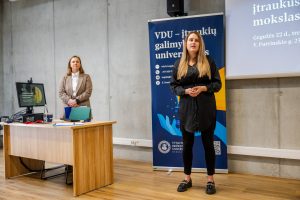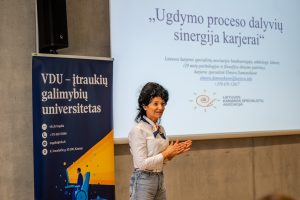Disability Forum: Inclusive Higher Education Was Held for the 3rd Time

On May 22, Vytautas Magnus University, as part of the implementation of its Disability Policy of the University of Inclusive Opportunities, organized the third Disability Forum: Inclusive Higher Education 2024. The event, which has now become a tradition, was attended by Lithuanian higher education experts experienced in creating reasonable accommodation and increasing the accessibility of higher education for persons with various disabilities or individual needs.
In her opening remarks, Dr. Simona Pilkienė, the Vice-Rector for Studies at Vytautas Magnus University, emphasized that the university is primarily concerned with its students: “Historical circumstances led to the closure of Vytautas Magnus University by the Soviet authorities, but from today’s perspective, I see this as an opportunity because Vytautas Magnus University was able to re-establish itself based on Western traditions, using the model of artes liberales. As we celebrate the 30th anniversary of the reconstituted university, we can see that this model has allowed us to develop a student-centered policy. The foundation of VMU is that the student is our value, and we must do everything we can to ensure that they not only feel at home here, make friends, and network but also return. We look forward to welcoming back all those who come back with their good experiences. Today, I see students, partners, and alumni here, which tells me that we all care deeply about the theme of an inclusive university.”
Opening this year’s Disability Forum, Miglė Janušauskaitė, VMU Disability Affairs Coordinator, encouraged the participants to share their experiences and engage in discussion because “this is what we are aiming for – not only to present what we already have and what we already know in universities and other higher education institutions, but more importantly, to address what we don’t yet know and what we could change to increase inclusion in higher education and give future students with disabilities the freedom to choose their study programmes.”
In her presentation, Indrė Širvinskaitė, President of the Lithuanian Disability Organisations Forum, Vice-Chair of the Commission for the Monitoring of the Rights of Persons with Disabilities, and moderator of this year’s Disability Forum, reviewed the main factors influencing the study choices of students with disabilities. “As far as we know from various studies, the situation of students with disabilities in Lithuania is changing very slowly, if not for the worse. The number of students with disabilities is decreasing, and there is no clear explanation why. However, we know that people with disabilities face barriers at every stage of their professional identity formation, and there is a serious lack of quality career guidance.”
Vaida Lukošiūtė, President of the Lithuanian Association of the Deaf, a lecturer, and a student at VMU, spoke about one of the barriers: the need for note-taking services for students with hearing impairments and the lack of such services. Vaida pointed out that deaf or hard-of-hearing students often do not apply to universities or other higher education institutions simply because they lack these services. “I know that we have many young, talented people in Lithuania who dream of higher education, but they don’t pursue it because they want to protect themselves, knowing what the experience will be like without adequate support. I hope that not only at VMU but also at other universities, note-taking services will become available, motivating more students to enroll.”
Paulius Vaitiekus, President of the Lithuanian National Union of Students, discussed the challenges of students’ choice of professional identity from the perspective of the European Students’ Union. Mr. Vaitiekus highlighted that “students should not have to prove their individual needs, and a single referral should be enough to create an accessible environment throughout the study process.” However, from the European Students’ Union perspective, accessibility and lack of information remain barriers: “Not all students facing difficulties have official diagnoses, and many do not see themselves as having individual needs, so they are simply unaware of the support measures available to them.”
Elmyra Damonskienė, co-founder of the Lithuanian Association of Career Specialists, educator, lecturer, and career specialist, presented a speech on “Synergy of the Participants in the Educational Process for a Career.” She mentioned various real-life examples where people’s disabilities did not stop them from reaching high levels of achievement and achieving their professional goals. “According to the United Nations Sustainable Development Goals, we all have the right to health and the right to education. The strong ‘backbone’ of a student with a disability is their ability to function under conditions of uncertainty.”
In the last presentation of the Forum, Daiva Pugevičienė, Coordinator of the VMU Career Centre and member of the Lithuanian Association of Career Specialists, spoke on the topic “Factors Influencing Students’ Professional Decision-Making: Practical Observations.” She shared her experience in counseling pupils and students, both with and without disabilities, on career issues. “One of the big problems I see is that parents are guiding their children with disabilities or individual needs without much information themselves. It’s important for higher education professionals working on inclusion to inform parents too, not just the students. So, dear people who work with these young individuals, with or without disabilities, the procedure and the rule is the same: see the person, recognize their strengths, provide all information about their possibilities, do not diagnose, do not judge, and do not dictate where they should go. Instead, ask what they want, ask questions that make them think about themselves, evaluate, and make the right choice.”
Discussion on “Choice of Higher Education for People with Disabilities/Individual Needs: Is the Choice of Field of Study the Only Challenge?” During the discussion, participants addressed the barriers and challenges that persons with disabilities face when choosing their studies. Representatives of different higher education institutions, students with disabilities, and other experts in the field discussed various aspects that often prevent persons with disabilities from entering higher education. The discussion was joined by prof. Jonas Ruškus, professor at VMU, former vice-chairman of the UN Committee of the Rights of Persons with Disabilities: “The variety of disability-related identities is very large – from physical disabilities, hearing and visual impairments to psychosocial disabilities, dyslexia, autism, and chronic illnesses – and therefore it is not always possible to compare the percentages of working capacity/participation, because they do not reflect the real needs of adapting the learning environment. This leads to major problems in identifying the needs of persons with disabilities in higher education.” The thoughts and insights expressed by the panellists confirmed that while efforts are being made to make higher education more inclusive, there is still room for improvement and further consideration by higher education institutions.

















